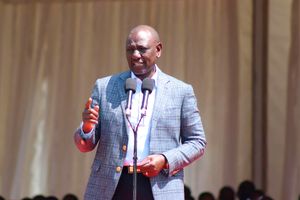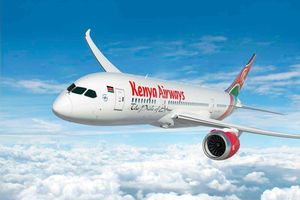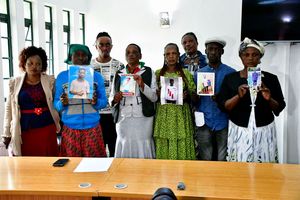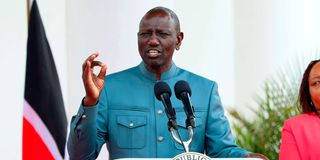
President WIlliam Ruto.
President William Ruto’s Cabinet is racing against time to meet fresh demands by the Head of State on key pet projects he wants finalised during his first term, with ministers required to submit a roadmap for implementation within the next two weeks.
Dr Ruto, who chaired a two-day National Executive Retreat in Karen, demanded that his Cabinet Secretaries and senior government officials prioritise the implementation of projects, insisting that there was no room for error.

President William Ruto leads members of the Cabinet in a prayer during a meeting at State House, Nairobi, on December 17, 2024.
Meanwhile, Deputy President Kithure Kindiki ordered ministries, departments, and state agencies to submit, within 14 days, proposals and roadmaps for government projects to be completed in the remaining two and a half years.
At the end of the retreat, President Ruto ordered top government officials to be more accountable, starting with procurement.
“Beginning July 1, all government procurement end-to-end will be on our E-platform. It is not a request; it is an instruction to all our accounting officers so that we can avoid fraud and eliminate inflation of government procurement costs that end up draining public resources,” President Ruto said.
“Government procurement must be above board and transparent. We should be able to know how many bid for a tender, who won, and how much was awarded.”
Personal liability for waste
The bid for an e-procurement system has been long in coming, beginning with President Uhuru Kenyatta’s government, but all efforts have come to naught, focus now on Dr Ruto and his team and the new deadline, elapsing in eight days.
He further directed that public officials should be held personally liable for wasteful spending, including procurement that he said ends up wasting taxpayers’ money.
“To avoid what our Auditor General said, the National Treasury, working with the Head of Public Service, must issue a circular and change the regulations so that such an audit takes the form of personal responsibility for that officer. Whoever is awarding a tender for something they know will not be of use to the public should carry responsibility for it,” President Ruto said.
He went on: “You find a public officer awarding a contract for the procurement of equipment for a facility that has not been built. For instance, a hospital has not been built, and they know ultimately it will cost the public wastage and sometimes complete loss.”
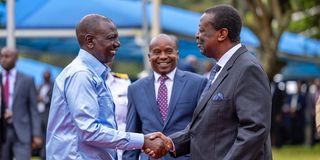
President William Ruto is leading the third National Executive Retreat, which marks a critical moment in the mid-term review of his administration as the sixth Kenya Kwanza government evaluates its performance since taking office in September 2022.
The retreat singled out court cases, geopolitical realignments, budget shortfalls, and misinformation through the battle of narratives as major challenges the Ruto-led administration continues to face, affecting its overall performance and service delivery since the Fifth Administration was installed in September 2022.
Other challenges included financial risks arising from budget shortfalls and counterpart funding gaps for programs supported by development partners, weak monitoring and evaluation systems, and the weaponisation of legitimate concerns into violent agitations.
"While considerable progress was evident in key delivery milestones, there were shortfalls and gaps in particular areas that needed to be addressed for the government to wholly fulfil its binding social contract with the citizens,” read the communiqué from the retreat.
Worried about the speed of government delivery and aiming to deepen public confidence in its ability to deliver, the President highlighted key priorities: boosting foreign exchange reserves by stimulating export growth and reducing non-essential imports; constructing ICT hubs across the country and procuring computers to run the hubs; and embracing a Whole-of-Government approach to procurement, including the local manufacture of equipment.
Dr Ruto, the communique said, expects the designated departments to improve the quality of data on all agricultural sub-sectors to inform evidence-based interventions that will consolidate and sustain gains in production, incomes, and job creation.
On education, the government plans to upscale teacher recruitment to support optimal teacher-learner ratios and continue the effective implementation of Competency-Based Education and Training.
To complement this, plans are underway to build laboratories and other essential facilities to upgrade all schools and enable them to offer high-quality education.
“Finetuning the new funding model for universities by streamlining and enriching the means-testing instrument to ensure every student is placed in the right band and to avoid disenfranchisement of any student,” read the communiqué.
Challenges identified
Social health security remains a priority for the President despite ongoing challenges.
“Government officials will be required to register every Kenyan and their dependents on the Social Health Insurance scheme to ensure they enjoy radiant health and can contribute optimally to nation-building,” read the communiqué from the retreat.
There will be a rollout of the supply and installation of modern medical equipment under different financing frameworks with counties and suppliers.
To address persistent issues with drug supply, the President plans to complete reforms of the Kenya Medical Supplies Agency (KEMSA) in accordance with the framework agreed upon between the national and county governments.
The retreat acknowledged lessons learned during the first half of the administration’s term, underlining the need to address risks that constrain effective service delivery while exploring emerging opportunities to strengthen the gains made.
The retreat received a mid-term performance report of the Fifth Administration, focusing on how the implementation of the Bottom-Up Economic Transformation Agenda has stabilised the economy, helping it overcome structural challenges, persistent shocks, and financial stress.
Under agriculture, the impact of subsidised fertilizer and connecting farmers through digital platforms was credited with scaling up agricultural value chains, contributing to food security through increased crop output and higher farmer incomes.
“The government must accelerate the off-take of farmers’ produce to put more money in their pockets,” read the resolutions in the government’s communiqué.
The retreat noted the visible impact of the affordable housing program in providing decent shelter, creating jobs—particularly for the youth—and stimulating construction industry value chains through supply contracts reserved for micro and small enterprises.
Under Universal Health Coverage, the meeting appreciated the remarkable growth in the number of Kenyans who have voluntarily registered for Social Health Insurance, which has scaled up to 23 million from eight million under the defunct National Health Insurance Fund.
The retreat also noted the unique setting of the Broad-Based Government formed in March 2025, following the signing of a Memorandum of Understanding between the United Democratic Alliance and the Orange Democratic Movement, pledging to work together for the betterment of all Kenyans.

